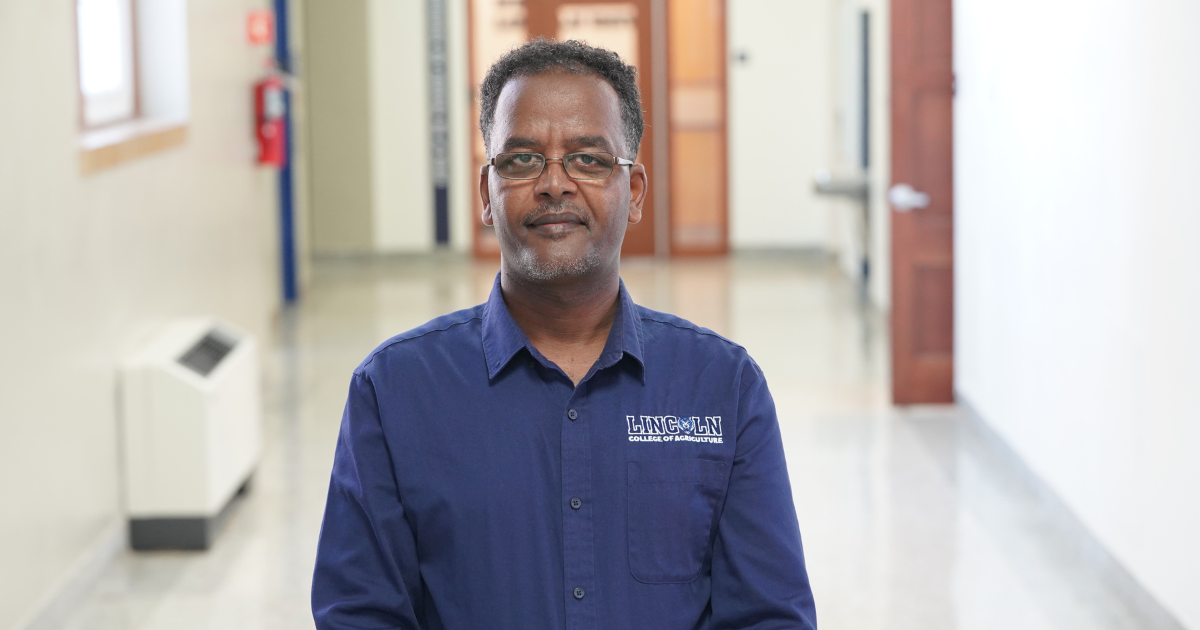Lincoln University Partners in $10 Million Project to Advance Climate-Smart Agricultural Practices
Office of Communications and Marketing
Young Hall
820 Chestnut Street
Jefferson City, MO 65101
 Dr. Tunsisa Hurisso, a soil scientist and research and extension assistant professor at the College of Agriculture, Environmental and Human Sciences at Lincoln University of Missouri, serves as the co-principal investigator and lead coordinator for the project activities at LU.
Dr. Tunsisa Hurisso, a soil scientist and research and extension assistant professor at the College of Agriculture, Environmental and Human Sciences at Lincoln University of Missouri, serves as the co-principal investigator and lead coordinator for the project activities at LU.
Lincoln University of Missouri (LU) scientists are participating in a multistate team led by Ohio State University that is launching farmer-focused, on-farm research and innovation into climate-smart agricultural practices and helping promote their adoption in the Midwest. They are receiving funding through a five-year $10 million grant to Ohio State University from USDA’s flagship Agriculture and Food Research Initiative's Sustainable Agricultural Systems (AFRI-SAS) program.
“Lincoln University will play an important role by executing this timely project and will work closely with historically underserved farmers in Missouri,” says Tunsisa Hurisso, a soil scientist and research and extension assistant professor in the LU’s College of Agriculture, Environmental and Human Sciences. Hurisso is a co-principal investigator and lead coordinator of project activities at LU.
The dominant crop and livestock production systems in the Midwestern United States are often highly specialized and input-dependent. With these systems, great gains have been made in terms of efficiency and productivity over the past several decades. However, as unintended environmental and ecological consequences, these gains come at the cost of declining soil health, water quality challenges, loss of biodiversity, and perhaps more importantly lack of resilience to extreme weather events.
Emerging climate-smart agricultural practices such as cover cropping, conservation tillage and integrated crop-livestock systems have the potential to reduce greenhouse gas emissions, increase climate resilience through carbon sequestration and soil health improvement and enhance farm viability. However, the traditional top-down approaches to boost the adoption of these conservation practices have been slow.
Farmers are often regarded as recipients of scientific results from experimental trials conducted at university research centers, rather than as equal partners who have a wealth of relevant experience and knowledge that can improve the design and assessment of climate adaptive practices.
This project uses the “From the Ground Up” approach, where farmers and scientists co-create the knowledge and management strategies necessary to accelerate the development and adoption of practical and locally adapted solutions in the face of a changing climate.
“Through this new project, we hope to promote the transformation of the landscape to be more resilient by co-creating solutions to logistical, agronomic and economic barriers that make it difficult for farmers to use conservation practices,” says project director Douglas Jackson-Smith, who is also a professor and Kellogg Chair of Agroecosystem Management in the College of Food, Agricultural, and Environmental Sciences at Ohio State University.
In addition to working with historically underserved specialty crop and livestock farmers in Missouri, Lincoln University will also serve as one of the two coordinators — along with Central State University in Ohio — of the education component of the project.
The education effort involves hands-on training in the form of integrated summer internship experiences for historically underrepresented college and high school students, as well as opportunities for graduate students and research and extension faculty to work with a more diverse and representative cross-section of farmers in both Missouri and Ohio.
Project co-investigators from Lincoln University include Dr. Mohan Acharya, Kimberly Cash, Dr. Addisu Ayele and Dr. Stephanie Clark.
For more information about the project, contact Hurisso at HurissoT@lincolnu.edu or call (573) 681-5047.
